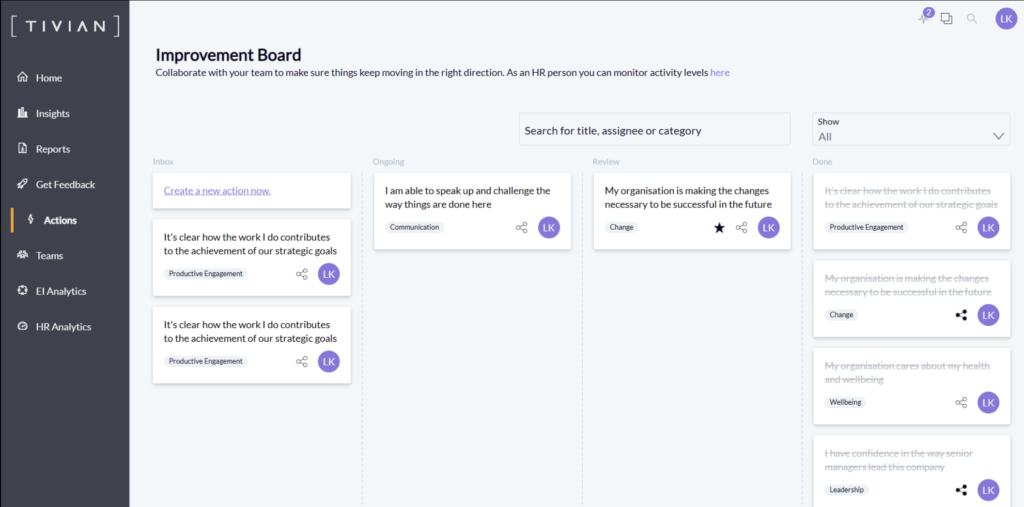Responding to staff feedback and taking action is the most important part of running an employee survey. In spending time providing feedback, employees will expect it to be reviewed, discussed and acted on. If they feel it’s being ignored, not only will they be unwilling to provide feedback in the future, but their level of engagement is likely to fall. We outline how to respond to employee feedback and the key steps you should take.
Get everyone involved in encouraging and acting on feedback
Before sending out surveys and attempting to respond to employee feedback, you need to clearly communicate the importance of gathering the feedback and the greater objective of improving company processes and the overall employee experience.
High-level issues affecting the whole organisation need to be addressed by leadership, while local issues should be addressed at an individual team level. This ‘top-down’ and ‘bottom-up’ approach is essential if all your people are to be actively involved in the process of improvement while seeing the commitment of leaders to act on their feedback.
Tivian’s 6 steps for responding to employee feedback
So, what’s the best approach to responding to employee feedback? Following these 6 steps will help line managers to understand how to respond to employee feedback meaningfully and use surveys and other information gathering methods to drive improvements:
1. Understand and discuss the feedback
Review your results to get a clear understanding of how employees are feeling. Compare your results to the rest of the organisation to see where you’re doing well and where improvements may be necessary. Discuss the results with your team to ensure you understand the reasons for the scores you’ve received.
2. Prioritise actions after responding to employee feedback
Whilst employee surveys can throw up many opportunities for improvement, we recommend that each team focuses on no more than three action areas. This ensures that all agreed actions can be progressed and given adequate attention. Respond to employee feedback in your team and work with team members to prioritise areas for improvement, voting on the most pressing issues to address.
3. Plan how actions can be implemented
Once action areas have been prioritised, you need to create solutions and build a vision for success. Involve employees in coming up with solutions that address problem areas identified. A plan of action must then be developed. The plan should consider what actions are required after responding to employee feedback, how they’ll be achieved, and who will be responsible for them. It should allocate responsibility for the different actions and identify specific timings for completion. This can be logged on an action board and shared with your team.
Take a look at Tivian’s action dashboard, which allows managers to collaborate, track and measure changes and provides HR teams with an overview of the action that teams are taking.

If you’d like to see this and other employee experience tools in action, you can book your product tour today.
4. Act on your improvement plans
Once plans have been created, actions can begin. Again, involve employees in this process and ensure actions are seen as a shared responsibility. You’ll learn how to respond to employee feedback effectively when embracing the process as collaborative.
5. Embed the feedback culture
Make sure that responding to feedback and taking action isn’t a one-off process but that it’s ongoing across the year and embedded into ways of working. You should look to foster a feedback culture within your organisation. This can be encouraged through regular discussions about the progress of actions and their effectiveness.
6. Monitor progress of feedback actions
To keep in touch with how employees are feeling between all-employee surveys, take advantage of weekly vibes and pulse surveys to capture employee feedback and work together to improve the employee experience.
How to respond to employee feedback effectively using digital employee engagement tools
Now you know how to respond to employee feedback strategically, you’ll be in a better position to leverage its value. However, using technology to help you gather, respond to and leverage employee feedback effectively will maximise your potential for improving your company’s employee experience and workplace culture.
Tivian offers cutting-edge employee experience management software, powered by AI and machine learning and designed for ease of use and data visibility, that empowers businesses to keep employees engaged, encourage a feedback culture and use insights to make meaningful changes to transform the employee experience.
Learn more about our employee experience platform or you can book a product tour today.



